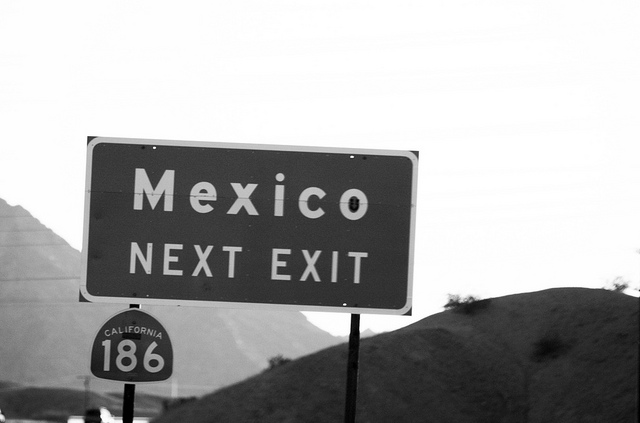
These are bullish times for cultural and economic trade between the United States and Mexico, even as the two nations struggle with thorny security threats along the border and lingering mistrust. On the merits, Mexico should stand alongside Britain and Israel among this nation’s indisputable “special relationships,” and yet many Americans don’t see it that way. In advance of “Is Our Marriage With Mexico Working?” a Zócalo event evaluating the state of the bilateral relationship—a North American marriage forged by geography and history—Zócalo asks a number of experts: “What would make the U.S. and Mexico get along better?”

That question needs to be answered on two levels. If one is to ascertain ways in which the governments of both nations can improve their relationship, I would answer by underscoring that the state of the Mexico-U.S. bilateral relationship has never been stronger and is actually thriving. Much has been achieved these past years in deepening and widening our bilateral ties. Triggered first by NAFTA’s passage and the exponential increase in trade and economic ties, and augmented by our dialogue on political and security issues during the past six years, our relationship has morphed from a transactional relationship, in which the interaction was based on deliverables and the give-and-take of issues both countries were pursuing or interested in, to a strategic relationship in which it is increasingly evident that shared values and outlooks on a wide array of issues are propelling our relations forward.
However, if the question is whether our two peoples understand the fundamental importance of the relationship, then the answer is: not yet. Beyond the pressing issues of the day-to-day interaction between Mexico and the U.S.—whether it’s trade and trade facilitation, border security and the fight against organized crime, immigration flows and labor mobility, energy in North America, scarce water resources on the border, and on and on and on—our most significant challenge is to leverage that sea-change in government-to-government relations to ensure that citizens on both sides of our border understand that no two countries are more important for each other’s security, prosperity and well-being than Mexico and the United States. Our two peoples need to become co-stakeholders, cognizant that the success of one nation will be the success of the other. And that needs to be achieved by using the presidential bully pulpit, and the growing assertiveness of mayors and governors of both nations as players in the international arena, but also by engaging in public and citizen diplomacy on both sides of our border, and leveraging the huge economic, social, and cultural interconnections that already bind communities across the Rio Grande.
Ambassador Arturo Sarukhan is Chairman of Global Solution/A Podesta Company, a strategic consulting and risk assessment firm in Washington, DC. A career diplomat for 20 years, he is the former Mexican Ambassador to the U.S., where he served for the last half-dozen years. He is a Distinguished Associate at Brookings.

The United States and Mexico cooperate better today than at any point in living memory, with the possible exception of the World War II years. Yet our differences and the border we share combine to make cooperation inevitably challenging. Analysts of U.S.-Mexico relations have produced a long “to-do” list to improve bilateral cooperation. For me, three priorities stand out in the current context.
A reform of U.S. immigration law that permanently institutionalizes the labor flow between the two countries to make undocumented migration uncommon. The current legislative proposal seems unlikely to achieve this because of sharp limits to the size of any temporary worker program.
Much more serious bilateral cooperation to help build the rule of law in Mexico—everything from the police to the judiciary to the legal profession to prisons to community involvement. Mexico cannot easily do this alone, but without this it will be impossible for Mexico to control, much less defeat, organized crime; without this it will be impossible for Mexico to meets its growth potential; and without this the United States will never see Mexico as a serious, equal partner.
More immediately, more people-to-people contact, especially among the nations’ youth and among individuals from regions in each country where contact with the other in very limited. Educational, cultural, and technical exchanges can help increase knowledge and understanding among neighbors and thereby help overcome deep-seeded stereotypes on both sides of the border that obstruct understanding, trust, and thus cooperation.
But at the end of the day, the U.S. and Mexico will remain prickly partners for the foreseeable future—the power asymmetry between our two countries inevitably breeds arrogance in the north and insecurity in the south while the deep integration of our economies and societies makes cooperation essential.
Pamela K. Starr is an associate professor and the director of the U.S.-Mexico Network at the University of Southern California.

Since the Bush Merida Initiative was announced in 2007, U.S. policy toward Mexico has been focused on expanding security operations south of the border. The drug war strategy promoted by Merida has led to more than 80,000 deaths in Mexico, more violence on the part of cartels, a dramatic increase in human rights violations and the erosion—rather than the strengthening promised—of the rule of law. The United States government should defund the disastrous Merida Initiative immediately.
Instead, programs to treat men and women addicted to drugs, to promote employment and education for at-risk youth, anti-money-laundering operations, corruption investigations and customs measures to stop the flow of illegal arms and cash could all be improved and expanded. These programs strengthen our communities and do not involve getting stuck in an expensive and lengthy foreign conflict or transferring resources to Mexican police and armed forces known to harbor corruption and human rights violators. They also would have a significant impact in weakening the cartels.
Comprehensive immigration reform would also remove a major source of friction in the relationship. Understanding labor flows as part of economic integration and eliminating the criminalization of migrants would finally place the issues in context and again save taxpayers billions of dollars. Finally, a “good neighbor” policy toward Mexico of mutual respect, non-intervention, educational and cultural exchanges and human rights would make both nations stronger, and rebuild a bilateral relationship that has been tragically reduced to a single failed strategy over the past five years.
Laura Carlsen is director of the Latin America Rights & Security Program, Center for International Policy.

To ask the question is to assume that relations are strained. On the surface, both countries get along well. Mexico is the United States’ third largest trading partner. Diplomatically, the two countries maintain cordial and peaceful relations and cultural exchanges continue as students, tourists, and expatriates choose the neighboring country as their desired destination.
So, what is the problem? The subtle strains defy simple answers, but revolve around lingering historical antagonism and economic exploitation.
Historically the relationship between the United States and Mexico has been an unequal one wrought with distrust and antagonism since the early nineteenth century. Today, the United States exercises its sovereign hold of the 1,969-mile U.S.-Mexico boundary through militarization. The border is host to double-fencing, stadium lighting, infrared night-tracking devices, drones, and a slew of other highly technical military-grade equipment. For many border residents, this is an affront to generations of mutual and interdependent cooperation. Increased militarization along the southern border sends the wrong message and disrupts the bilateral exchanges of border communities.
Interdependence will forever bind these two nations. Both depend on each other for their wealth of natural and commercial resources. But trade policies, specifically NAFTA, need to be restructured in order for a fair and balanced economic relationship to emerge. The future relationship between the United States and Mexico cannot be based on inequality and antagonism.
Miguel A. Levario is an assistant professor of History at Texas Tech University and author of Militarizing the Border: When Mexicans Became the Enemy (College Station: Texas A&M University Press, 2012).

The residents of Boquillas del Carmen—just across the Rio Grande from Big Bend National Park—celebrated when the border crossing there reopened on April 10. The crossing had been closed following the 9/11 attacks, leaving a community isolated and a popular tourism destination nearly inaccessible to visitors from the north.
The reopening of that small border crossing is cause for celebration. It’s more than a gateway to Mexico for tourists and a source of income for local tour guides and artisans, it’s also a symbolic example of the many efforts the U.S. and Mexico, along with Canada, are taking to protect North America’s environment and the health of its communities through the unique partnerships fostered by the Commission for Environmental Cooperation.
Boquillas is in the heart of the Big Bend-Río Bravo region, a spectacular landscape shared by the United States and Mexico that is home to a rich diversity of native and migratory creatures to whom political boundaries are meaningless. The Commission is currently working with U.S. and Mexican conservation agencies and others to protect this treasured ecosystem by strengthening science-based natural resource management, identifying conservation priorities and working with communities in the region to promote sustainable tourism.
It’s just one example of how closer ties, brought about through a free trade agreement, have allowed the U.S. and Mexico to “get along” and collaborate on protecting and improving their shared environment.
And even when tough environmental issues arise between our countries—we’ve just published a major report on the potential environmental and health hazards of recycling spent lead-acid batteries in Mexico—the environmental cooperation agreement established under NAFTA helps make this relationship work better by providing a forum to identify cross-border environmental issues and find innovative solutions.
Irasema Coronado is Executive Director at the Secretariat of the Commission for Environmental Cooperation, created as part of the North American Free Trade Agreement to protect the environment of North America and the health of its citizens. She has worked for 20 years on U.S.-Mexico border issues, most recently as a political science professor at the University of Texas at El Paso. Learn more at http://www.cec.org.



